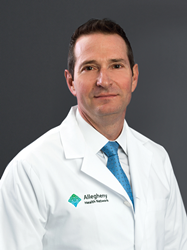
Joseph Aracri, DO, System Chair, Pediatrics, Allegheny Health Network
“We urge parents to contact their pediatricians with any questions they may have and to try to remain calm.” Joseph Aracri, DO, System Chair, Pediatrics, Allegheny Health Network
PITTSBURGH (PRWEB)
May 19, 2022
A nationwide shortage of infant formula has parents frightened and angry – and busy visiting stores, websites and social media groups in search of the products they need to feed their babies.
“Over the past few weeks, our doctors and other caregivers have been deluged with questions from parents regarding the shortage of baby formula,” said Joseph Aracri, DO, System Chair, Pediatrics at Allegheny Health Network (AHN). “We certainly understand that it can be frightening and frustrating to not be able to find formula at your neighborhood store, or not be able to find the type of formula your baby requires.”
“We are hopeful that recent actions taken by, or under consideration by, the U.S. Food and Drug Administration will help address this problem. In the meantime, we would like to provide some direction to parents based on the most frequently asked questions we hear are receiving,” Dr. Aracri said.
-
When supermarkets and “big-box” stores are out of formula, check drug stores or baby supply stores. Call first to ensure they have supply on hand. When searching online, stick to well-known distributors and pharmacies rather than auction sites. Social media groups, food banks and charity organizations may also have leads on where to buy formula. - Most babies are OK with any available formula. (The only exception is for babies who need an extensively hydrolyzed or amino acid-based formula such as Elecare, according to the American Academy of Pediatrics.) If you have some of the old formula available, you may want to mix it with the new formula to minimize any digestive upset.
- Do not attempt to make more baby formula by adding more water, or use homemade formula recipes circulating on the internet. These practices are not safe, and can lead to nutritional imbalances, health problems and even infant deaths.
- Toddler formulas are safe for a few days for babies who are close to a year old, and “premature” formula can also be used safely for a few weeks.
- For babies age 6-12 months who drink regular formula, cow’s milk may be used for a brief period of time. Make sure to include iron-rich solid foods in the baby’s diet. We do not recommend goat’s milk, almond milk or other plant milks. Soy milk fortified with protein and calcium may be used in an emergency for babies about a year old.
- Breast milk banks are available on a very limited basis to high-risk babies such as those born prematurely or with low birth weight and can provide safe, pasteurized breast milk; however it is not safe to share breast milk amongst friends, relatives or acquaintances.
- Babies older than 6 months can also begin to get more nutrition from solid, pureed food.
- If you can breastfeed, do. The American Academy of Pediatrics recommends breastfeeding as the sole source of nutrition for infants up to six months. If you initially decided not to breastfeed, or stopped early, it is sometimes possible to resume breastfeeding, a process called relactation. AHN Lactation Consultants can also be reached by calling (412) 578-7030.
- Don’t make the shortage worse – buy only a 10 day to two-week supply, to help everybody have a chance to buy what they need.
“Even with the potential reopening of a domestic formula manufacturing plant, and the potential loosening of restrictions on imported baby formula, this current shortage may last several weeks longer,” Dr. Aracri said. “We urge parents to contact their pediatricians with any questions they may have and to try to remain calm as we work through this difficult situation.”
AHN Pediatrics treats children from birth to age 21 with a team of expert pediatricians, family physicians and other providers who provide high-quality care in a comfortable, supportive environment at more than 15 locations across the Pittsburgh region.
###
About the Allegheny Health Network:
Allegheny Health Network (AHN.org) is an integrated healthcare delivery system serving the greater Western Pennsylvania region. The Network is composed of 14 hospitals, ambulatory surgery centers, Health + Wellness Pavilions, an employed physician organization, home and community-based health services, a research institute, and a group purchasing organization. The Network provides patients with access to a complete spectrum of advanced medical services, including nationally recognized programs for primary and emergency care, trauma care, cardiovascular disease, organ transplantation, cancer care, orthopedic surgery, neurology and neurosurgery, women’s health, diabetes, autoimmune disease and more. AHN employs approximately 21,000 people, has more than 2,600 physicians on its medical staff and serves as a clinical campus for Drexel University College of Medicine and the Lake Erie College of Osteopathic Medicine.
Share article on social media or email:

